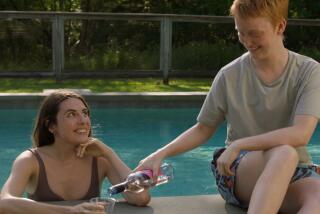Breezy ‘Frankie’ by Ira Sachs allows Isabelle Huppert and company room to roam
- Share via
If there is such a thing as a breezy drama, director Ira Sachs’ lovely and pensive new film “Frankie” fills that niche. Although it may initially seem like a fairly wispy story of family dynamics and romantic uncertainty, there’s a subtle depth to the proceedings that creeps up on you in resonant ways.
Sachs, whose well-regarded, more recent big-screen output includes the mature, gay-themed portraits “Keep the Lights On” and “Love Is Strange,” and the bittersweet coming-of-age tale “Little Men” (all written by Sachs and his “Frankie” collaborator Mauricio Zacharias), leaves those films’ integral Manhattan settings here for the gorgeous, historic, upscale coastal town of Sintra, Portugal.
Suffice to say, after 90 or so minutes gazing at the movie’s transporting, deftly shot locale, you’ll want to hop the first plane to nearby Lisbon — or at least dream about doing so.
Amid Sintra’s lush landscape, enveloping mountains and ancient landmarks we find the title character, François “Frankie” Crémont, a famous French actress (played with an intoxicating mix of soulfulness and remove by the estimable Isabelle Huppert), who has gathered her family plus a dear friend for a cozy group vacation.
It soon becomes clear, however, that Frankie has been diagnosed with terminal cancer and not only wants a possible last hurrah with her loved ones but has a few agenda items to tick off before all is said and done.
At the top of Frankie’s list: to pair off Paul (Jérémie Renier), her floundering son from her first marriage to Michel (Pascal Greggory), to her showbiz hairstylist friend, Ilene (Marisa Tomei). That Ilene is already seeing Gary (Greg Kinnear), a cinematographer eager to escalate both their relationship and his career, matters little to Frankie who, it’s pointed out, usually gets what she wants. But will she?
Frankie’s circle also includes second husband Jimmy (Brendan Gleeson), whose daughter from a previous marriage, Sylvia (Vinette Robinson), is considering divorcing spouse Ian (Ariyon Bakare). Meantime, Sylvia and Ian’s teen daughter, Maya (Sennia Nanua), unnerved by her parents’ possible split, seeks solace with a sweet Portuguese boy (Manuel Sá Nogueira) she meets en route to the beach who, perhaps too conveniently, is the product of divorced parents.
The action, such as it is, unfolds over the course of a single day, often in one-on-one chats over cafe tables, in hotel rooms, during walks on garden paths and cobblestone streets, and in strolls above the ocean. Sachs’ unhurried pacing and longish takes allow his characters the freedom to clash, ponder, grow, reveal and resolve in front of our eyes, as if in real time.
The film is filled with quite a few effective moments and shots, particularly a stunningly used wall of blue tile, Frankie’s reluctant visit to an elderly fan’s birthday party, Gary’s tone-deaf movie pitch to Frankie, Frankie and Jimmy’s quiet romantic interlude that speaks volumes, and a stirring and boldly conceived closing image.
With its occasionally formal dialogue and theatrical vibe, “Frankie” (yes, not the most memorable title) evokes such ensemble assemblage films as Woody Allen’s “September,” Henry Jaglom’s “Last Summer in the Hamptons” and the 2014 Patricia Clarkson drama “Last Weekend,” as well as Anton Chekhov’s classic play “The Seagull” and its screen adaptations. (Sachs says he took inspiration from such Éric Rohmer art-house hits as “Pauline at the Beach” and “Claire’s Knee.”)
Like some of the aforementioned works, Sachs and Zacharias’ literate script revolves around a largely rarefied group of people whose problems — Frankie’s failing health and its ramifications aside — can come off a bit navel-gazing given the general state of the world these days.
Although not inauthentic per se, decisions about maintaining an Upper West Side Manhattan apartment as well as one’s county home, ploys to avoid inheritance taxes or a debate over the merits of making a multimillion-dollar donation to charity are just a few passing concerns that may test viewers’ patience with several of the characters.
Still, it’s a minor quibble for a film that whisks us away, showcases such a talented and eclectic array of performers, and reconfirms a singular filmmaker’s affecting artistry.
'Frankie'
In English, French and Portuguese with English subtitles
Rated: PG-13, for some brief strong language and sexual material
Running time: 1 hour, 38 minutes
Playing: Starts Oct. 25, Laemmle Royal, West Los Angeles
More to Read
Only good movies
Get the Indie Focus newsletter, Mark Olsen's weekly guide to the world of cinema.
You may occasionally receive promotional content from the Los Angeles Times.










